2018
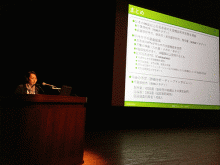
WKC Forum report “Japan to the world- Achieving sustainable UHC for older people”
The WHO Kobe Centre (WKC) organized the WKC Forum "Japan to the world- Achieving sustainable UHC for older people" in cooperation with the 72nd Annual Meeting of Japanese Society of National Medical Services on November 10th, 2018, at the Kobe International Conference Centre Main Hall.
At the Forum, researchers presented three studies being conducted as a part of the WHO Kobe Centre New Research Initiative: Lessons Learned from Japan to the World, based on a WKC call for proposals in 2017.
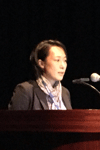
Dr Misato Nihei, a lecturer at the Graduate School of Frontier Sciences at The University of Tokyo, gave a presentation on “Experiences of Assistive Products Use among Older People in Japan”.
“There are currently around 70,000 centenarians in Japan’s aging society,” Dr Nihei explained. “The use of assistive products, which include assistive technology and equipment, is essential for older people to not only overcome obstacles in their environment but also to live more comfortably at home and remain active and engaged members of society. It is possible for older people to use a wide range of assistive products available under long term care insurance, for example, wheelchairs, beds, walkers, canes, handrails and slopes. There has also been a recent surge in the development of robotic assistive technology for caregiving.”
A questionnaire done in Itami City showed that people who use assistive products most commonly use five different products at the same time. Also, as people grow older, they use devices to assist with sitting and sleeping. Using dentures, eyeglasses and handrails is particularly common. The survey also revealed that only around 2% of respondents did not use any assistive products. The researchers will carry out interviews during the next stage of the study.
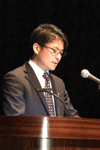
Dr Shinichi Tomioka, Assistant Professor at the Department of Preventive Medicine and Community Health at the University of Occupational and Environmental Health (UOEH), gave a presentation on “Evidence for improving health care provision to ensure universal health coverage amid rapid population ageing in Japan.”
“Large-scale administrative data are still relatively underutilized in health research in Japan,” Dr Tomioka said. “For instance, the medical fee reimbursement database covers an enormous number of patients, and provides accurate information on the administered treatments, prescription medication, medical fees and other items. We are now able to extract the information we require from this large-scale administrative data, and use it to establish a large amount of multifaceted evidence.”
This research analyses data among patients that used outpatient care, home care, disaster health care, and acute hospital care. The analysis of data on 16,000 outpatients found that an individual visits three different facilities for outpatient care annually on average. The most common diseases treated are high blood pressure, hyperlipidemia and gastritis. Analysing medical fees revealed that 30% of patients account for over 70% of the fees, with dialysis for renal failure and anti-cancer medicines being the costliest items.
For disaster health care, the researchers developed a new mobile application J-SPEED+ (Japanese Surveillance in Post-Extreme Emergencies and Disasters). Information on the location, condition and number of patients in disaster-affected areas is entered into the system using a smart phone; this information can then be immediately tallied and viewed at the Disaster Management Headquarters. J-SPEED+ is designed to make disaster health care data more visible.
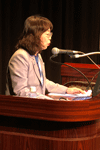
Dr Takako Tsutsui, Professor in the Department of Public Health at the University of Hyogo gave a presentation on “ICF (International Classification of Functioning, Disability and Health)-based assessment tool development for care skill training in the Japanese long-term care system.”
Dr Tsutsui explained, “It is becoming increasingly difficult to secure long-term care workers to look after the growing number of old people, and there is already a perpetual lack of workers in the industry. The most pressing issue at present is developing ways to maintain the existing long-term care workforce, and also attract new workers by making long-term care a more viable and rewarding career path.”
Since Japan’s long-term care is well established, long-term care has been added as a component of the government’s Technical Intern Training Programme. This new programme is for foreign trainees who wish to work in the long-term care field. This study used the WHO’s International Classification of Functioning, Disability and Health (ICF) framework to objectively evaluate whether the trainees have acquired the necessary level of technical skills and techniques through the programme. The study found that while the items in the evaluation tool are useful, there are several tasks that require Japanese language and cultural competency.
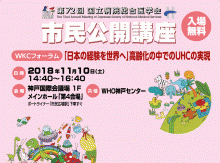
WKC Forum “Japan to the world- Achieving sustainable UHC for older people”
Today, most people can expect to live into their sixties and beyond. By 2050, the world’s population aged 60 years and older is expected to reach 2 billion, up from 900 million in 2015.
Japan has long been a front runner enabling its people to live long healthy lives. Many lessons from Japan can be adapted for other countries and their health systems to enable them to learn from Japan’s experience in facing powerful and transforming demographic forces.
The WHO Kobe Center is organizing a public open forum "Japan to the world- Achieving sustainable UHC for older people" in cooperation with the 72nd Annual Meeting of Japanese Society of National Medical Services on November 18th, 2018, to highlight research in this area.
WKC Forum “Japan to the world - Achieving sustainable UHC for older people”
Date: November 10, 2018 14:40-16:40
Venue: Kobe International Conference Center Main Hall 1F
No registration necessary.
For more information, please contact the secretariat at 06-6221-5933
Programme
14:40 Opening
Dr Sarah Louise Barber, Director of WKC
Research progress report
Chair: Shinjiro Nozaki, External Relations Officer of WKC
14:50 “Experiences of Assistive Products Use among Older People in Japan”
Dr Misato Nihei, Lecturer, Graduate School of Frontier Sciences, University of Tokyo
15:25 “Evidence for improving health care provision to ensure universal health coverage amid rapid population ageing in Japan”
Dr Shinichi Tomioka, Assistant Professor, Department of Preventive Medicine and Community Health, University of Occupational and Environmental Health, Japan
16:00 “ICF-based assessment tool development for care skill training in Japanese long-term care system”
Prof Takako Tsutsui, University of Hyogo
16:35 Conclusion
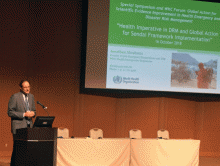
WKC Forum report "Global Action for Scientific Evidence Improvement in Health Emergency and Disaster Risk Management"
On October 16th, 2018, the WHO Kobe Center organized a public open forum, "Global Action for Scientific Evidence Improvement in Health Emergency and Disaster Risk Management (H-EDRM) – Expected Contribution from Asia and Pacific Region," in cooperation with the Asia-Pacific Conference for Disaster Medicine at the Seaside Hotel Maiko Villa in Kobe city. The forum attracted a good turnout with approximately 200 people in attendance at the forum.
In the keynote speeches, Mr Jonathan Abrahams, Disaster Risk Management Focal Point, Country Health Emergency Preparedness and International Health Regulations (CPI) Department of WHO said “The DRM concept transforms emergency response work from reactive to proactive, from hazard based focus to vulnerability and capacity foci, and from a single agency approach towards a multisectoral approach. WHO is developing its Health Emergency and Disaster Risk Management (H-EDRM) Framework to encompass a comprehensive approach for H-EDRM”
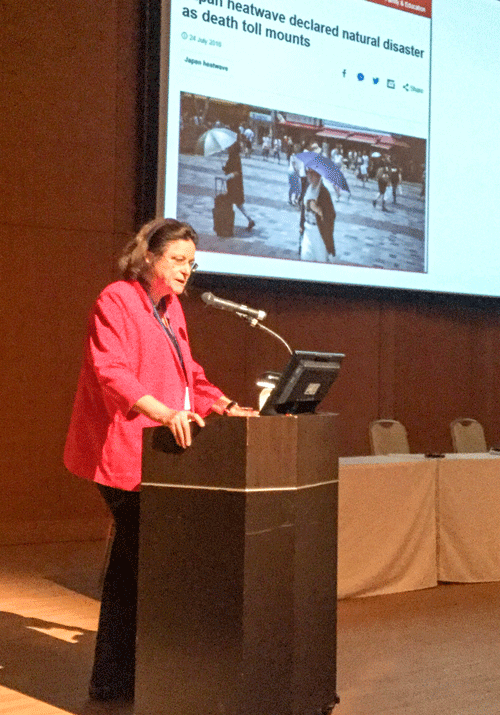
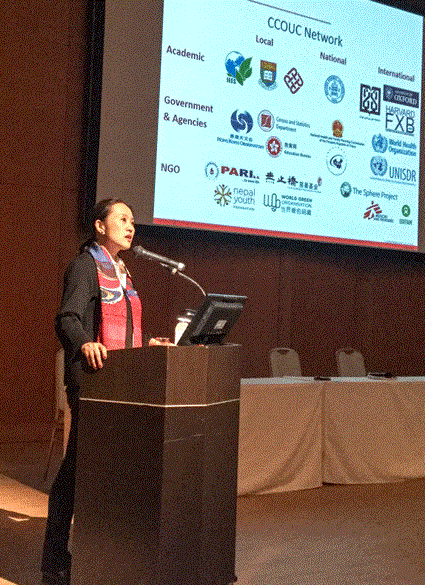
Professor Virginia Murray, Head of Global Disaster Risk Reduction, Public Health England introduced recent progress of the WHO Thematic Platform for H-EDRM Research Network, and emphasized the value of this new network for the study and delivery of evidence that is needed to support the monitoring and evaluation of H-EDRM programs. The research network will also drive the development of innovative health data management systems for use on the ground following disasters.
Professor Emily Ying Yang Chan, the Chinese University of Hong Kong (CUHK) said “Emergencies and disasters are known to have tremendous adverse impact on people’s lives and livelihood. Many research gaps exist and there is a special need for research to deliver and support evidence informed health emergency and disaster risk management (H-EDRM) at the global, national and local levels”. Professor Chan also called for strong research collaborations to strengthen this area of work.
In the following panel discussions, “Post-disaster health support system and data management system in Japan” and ”Post-disaster psychosocial management and research activity”, key areas of work in H-EDRM research were introduced by experts and a candid discussion followed.
Related links
Programme and Speakers
The 14th Asia-Pacific Disaster Medical Society Official Website: http://www.apcdm2018.org/index.html
Forum flyer "International Disaster Medical Prefectural Forum - Toward the World from Kobe / Hyogo": http://apcdm2018.org/data/program/hyogo_forum02.pdf
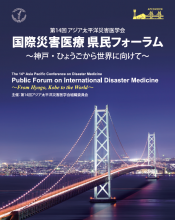
WKC Forum "Global Action for Scientific Evidence Improvement in Health Emergency and Disaster Risk Management –Expected Contribution from Asia and Pacific Region-"
The WHO Kobe Center is organizing a public open forum "Global Action for Scientific Evidence Improvement in Health Emergency and Disaster Risk Management (H-EDRM) –Expected Contribution from Asia and Pacific Region-" in cooperation with the Asia-Pacific Disaster Medical Society on October 16th, 2018.
Over the past few decades, the frequency and severity of natural disasters has accelerated, and tragically, with ever increasing damage and losses to health, life and property in the region. Therefore, there are key questions around what measures and policies are required to protect people's health and living from natural disasters.
In 2016, WHO called upon global experts and researchers to set up the WHO Thematic Platform for H-EDRM Research Network (TPRN). Within the network, core members engaged in discussion and debate, examined policies related to health emergency and disaster risk management, and began to move towards improving scientific evidence.
This WKC Forum will introduce recent progress of the TPRN activities and discuss possible global applications of knowledge and experiences from Japan and the Asia-Pacific region. Significant learning is possible from this region since it faces natural disasters frequently and globally, contains the largest number of affected people.
In recent years, a novel method for post disaster medical data collection was developed within the Asia-Pacific region. This has now been adapted by the Emergency Management Team Strategic Advisory Group (EMTSAG) which is convened by the WHO, and forms the basis for a Minimum Data Set (MDS) system that may be deployable in many settings and situations globally. The future use of the MDS and the application and utility of other available data to understanding disasters’ long term impact on health will also be discussed at this forum.
Date: October 16, 2018 15:15-18:30
Venue: Seaside Hotel Maiko Villa 2F
Language: Japanese / English simultaneous interpretation
Capacity: 300 people
Please refer to the Forum flyer for the registration fee and procedures.
For more information, please contact the forum secretariat at 078-241-3131
※ WKC Forum "Global Action for Scientific Evidence Improvement in Health Emergency and Disaster Risk Management –Expected Contribution from Asia and Pacific Region-" is a part of the 14th Asia Pacific Conference on Disaster Medicine “Public Forum on International Disaster Medicine ~From Hyogo, Kobe to the World”
"Global Action for Scientific Evidence Improvement in Health Emergency and Disaster Risk Management –Expected Contribution from Asia and Pacific Region-"
Programme and Speakers
Moderator: Dr Ryoma Kayano, WKC
Opening remarks:Dr Sarah Louise Barber, Director, WKC/Dr Shinichi Nakayama, Conference President, APCDM
Keynote Speech
- Mr Jonathan Abrahams, WHO
- Professor Virginia Murray, Public Health England
- Professor Emily Ying Yang Chan, The Chinese University of Hong Kong
- Professor Teodoro Herbosa, University of the Philippines
- Dr Tatsuhiko Kubo, University of Occupational and Environmental Health
- Dr Phumin Silapunt, Chulabhorn Hospital, Thailand
Panel discussion: Key Area of Work in H-EDRM Research and Up-to-Date Activities
Part 1: “Post-disaster health support system and data management system in Japan”
Chairs: Dr Tatsuro Kai, Saiseikai Senri Hospital and Professor Emily Ying Yang Chan, the Chinese University of Hong Kong
- Dr Yasuhiro Otomo, Tokyo Medical and Dental University Graduate School of Medicine
- Dr Sayaka Gomei, Dokkyo Medical University
- Dr Toshiyuki Ojima, Hamamatsu University School of Medicine
- Dr Shinichi Egawa, Tohoku University
Part 2: “Post-disaster psychosocial management and research activity”
Chairs: Dr Sho Takahashi, University of Tsukuba and Professor Virginia Murray, Public Health England
- Dr Yoshiharu Kim, National Center for Neurology and Psychiatry
- Dr Mélissa Généreux, University of Sherbrooke, Canada
- Professor Sonoe Mashino, University of Hyogo
- Dr Kaninn Keeratipongpaiboon, Bangchak Hospital, Thailand
Closing remarks:
- Dr Heather Papowitz, WHO Regional Office for the Western Pacific
- Dr Nilesh Buddh, WHO Regional Office for South-East Asia
Related links
Programme and Speakers
The 14th Asia-Pacific Disaster Medical Society Official Website: http://www.apcdm2018.org/index.html
Forum flyer "International Disaster Medical Prefectural Forum - Toward the World from Kobe / Hyogo": http://apcdm2018.org/data/program/hyogo_forum02.pdf

WKC INTERNSHIP HIGHLIGHT
WKC is proud that Dr Nils Dahl, who was an intern here at the WHO Kobe Centre, has published his work on “Self-neglect in older populations: A description and analysis of current approaches” in the Journal of Ageing and Social Policy (Abstract: https://www.tandfonline.com/doi/full/10.1080/08959420.2018.1500858. Accepted Manuscript (PDF)) . Dr Dahl began this project whilst interning at WKC in 2016. This work is a valuable contribution to global thinking around the issue of self-neglect in older age and opens up avenues for potential new research in the area.
An internship at the WHO Kobe Centre not only provides students with global public health related work experience, it can also support students in defining their career path. Our interns receive a high level of expert supervision and support during their time at the WHO, and as can be seen from the experience of Dr Dahl, are also given the opportunity to participate in and contribute to important global public health agendas cum research on issues critical to Universal Health Coverage and the impact of population ageing. An internship at WKC can help with assessing “fit” to a career in global public health, acquisition of life and professional skills, and opens doors to new possibilities through professional contacts and networking opportunities. Please see our website for more details on how to apply for an internship at the WKC (https://extranet.who.int/kobe_centre/en/employments).
Kobe city is the beautiful waterfront city with a long history of international exchange, global outreach and communication. There is much to enjoy through exploring Kobe and the rest of Japan during an internship.
PS - We would also like to add that Kobe is a pretty fun place to live in!
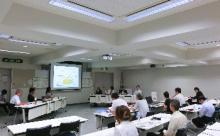
Thinking about health promotion for the World EXPO 2025
The proposed theme for the World EXPO 2025 by Osaka (one of the candidate cities) is “Designing Future Society for Our Lives”. Based on the theme, Osaka prefecture has selected a vision of “10 years younger” for their initiatives. In order to implement the vision and to make it well known among the citizens, Osaka prefecture held a series of workshops inviting experts during July and September this year.
On September 5th, Dr Megumi Rosenberg, Technical Officer of the WKC attended the fifth workshop and explained about the WHO’s initiatives on the achievement of UHC and the impacts of population ageing.
During the discussions, Dr Rosenberg emphasized, “Health promotion is not determined by personal effort alone but is heavily influenced by the environment. Health promotion needs to be infused into people’s everyday life to ensure that no one is left behind, including those who are indifferent. In order to make that happen, multidisciplinary, multisectoral collaborations to promote health are essential. I look forward to more innovative partnerships for health promotion that are uniquely “Osaka-style”, such as the collaboration between Yoshimoto Kogyo (an Osaka-based entertainment conglomerate) and various health research institutions introduced in today’s workshop.”
More details on the workshop (Osaka prefecture website)
http://www.pref.osaka.lg.jp/kikaku_keikaku/inochi_v/inochi_ws.html
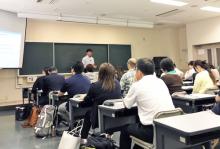
Training hospital administrators to use data for better care
From June 14 to 16, 2018, the University of Occupational and Environmental Health, Japan (UOEH) held an advanced training course on healthcare data analysis to develop capacity to perform advanced analysis using healthcare data. The course was conducted as a part of UOEH’s research project on “Evidence for improving health care provision to ensure universal health coverage amid rapid population ageing in Japan”, funded by the WKC. The course was first held in November last year. On this second occasion, 30 mid-level administrators from hospitals across Japan participated.
UOEH’s research project aims to provide evidence for more efficient, equitable and cost-effective health care delivery in Japan at the primary and secondary care levels spanning four domains: 1) outpatient care, 2) home care, 3) disaster health care, and 4) acute hospital care.
As a part of this project, UOEH is organizing three capacity-building courses to improve the skills of hospital administrators to handle large-scale healthcare data, from data input to advanced analysis.
In his opening remarks on the first day of the training, the Principal Investigator of the research, Dr Shinichi Tomioka, Assistant Professor, Department of Preventive Medicine and Community Health, UOEH said, “Data accuracy is essential in order to share valuable lessons and evidence from Japan’s healthcare system. Information/data governance is becoming increasingly important for healthcare facilities seeking to provide higher quality care efficiently. Building the capacity of the healthcare workforce to manage data, therefore, is very important”. The participants need to attend the lectures and workshops and submit a report to complete the course.
The course will be offered for the third and final time in November this year.
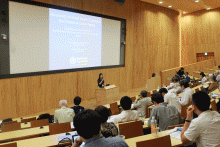
WKC’s new research about Experiences of Assistive Products Use among Older People in Japan presented at the international symposium
On June 27, the international symposium "Assistive Products & Services Supporting Centenarians Lives” was held at the University of Tokyo to discuss roles of assistive technologies and services to support very old people over 90 and 100 years old. Dr Megumi Rosenberg attended the symposium and introduced WKC’s agenda on universal health coverage and related research activities.
The University of Tokyo and WKC launched new collaborative research, “Experiences of Assistive Products Use among Older People in Japan,” which involves a survey of individuals 90 years old and above about their experiences with assistive products.
In the session, the principal Investigator of the research, Dr Misato Nihei, Lecturer, Graduate School of Frontier Sciences, said ”We hope the insights gained from this study of Japanese nonagenarians and centenarians will contribute to improving assistive products and services for older people worldwide.” Dr Megumi Rosenberg said “Assistive products and services are an essential aspect of universal health coverage especially for ageing populations. We expect this research to contribute to the achievement of universal health coverage in Japan and in other countries as population ageing progresses.”
Researchers from Japan and Ireland shared new research and discussed strategies for the optimal provision of assistive products and services to older populations.
Related links
- “Experiences of Assistive Products Use among Older People in Japan” WKC Research brief
- WKC Launched New Research Initiative for UHC and Ageing Populations - Lessons learned from Japan to the World
The University of Tokyo sites (Japanese only)
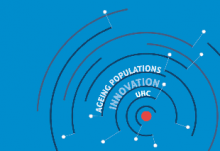
The WHO Kobe Centre launches a new website
Since its establishment, the WHO Kobe Center has been conducting research on various themes such as "urbanization" and "ageing" as a policy research center of the WHO headquarters. With the vision of “Innovations for sustainable universal health coverage”, WKC now conducts research about "Universal Health Coverage (UHC)", "Innovations", "Aging", and “Health Emergencies” as the four pillars.
We are happy to announce that we have revamped the website of the WHO Kobe Center in both Japanese and English, showcasing new WKC research and activities. We will continue disseminating information about new research collaborations and events through our website.
Sarah Louise Barber, Director of the WHO Kobe Center stated, "The purpose of this website is to evaluate and publish valuable lessons learned globally and in Japan to promote sound policy and innovations. Such knowledge from Japan and elsewhere needs to be utilized to address major health challenges. "
For details, please visit the WHO Kobe Center website.
http://www.who.int/kobe_centre/en/
http://www.who.int/kobe_centre/ja/

World No Tobacco Day, 31 May 2018
Tobacco use is an important risk factor for the development of coronary heart disease, stroke, and peripheral vascular disease.
Despite the devastating harms of tobacco to heart health, and the availability of solutions to reduce tobacco-related death and disease, knowledge among large sections of the public that tobacco is one of the leading causes of CVD is low.

